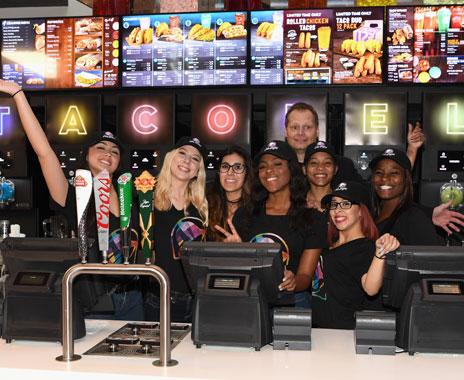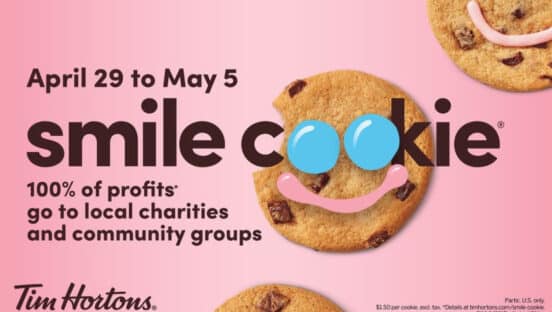On the surface, Taco Bell’s plan to create 100,000 new jobs by 2022 is simple math. The brand recently announced a growth model that calls for roughly 200 stores annually over the next six years, or a total of 8,000 stateside and 9,000 globally by that date. More restaurants means more jobs, naturally, but it’s the substance behind the equation that Taco Bell wants to share with the public.
Frank Tucker, the chain’s chief people officer, says Taco Bell has, in reality, been championing this cause for quite a while.
“I just don’t think we’ve been doing a good job publicizing the fact,” he says. “We felt like it was important to try to be a lot more public about it because we do want to add 1,000 stores in the U.S. over the next few years, and to add 1,000 stores in the U.S. we need a lot of people to start working at Taco Bell.”
Tucker also understands what the company is up against. In the last two months—for the first time in three years—job creation increased by less than 1 percent in the restaurant industry, according to TDn2K, a company that collects weekly sales from nearly 26,000 units and 130-plus brands. Even more pressing, the data showed that employee turnover, which has been trending upward since 2010, reached a mark surpassing anything reported in the past decade.
In early November, Taco Bell launched its “Start with Us, Stay with Us,” platform aimed at defying this trend. Tucker says it highlights the company’s dedication to its employees, whether they’re first entering the workforce or reaching for that next rung of the corporate ladder. “We think it’s an important story,” Tucker says. “We don’t view it just as a nice thing to do. We view it as something that’s going to help Taco Bell become a better brand, help employees become better employees, and eventually improve everybody all around.”
As for what Taco Bell has planned, Tucker says it’s in direct correlation to what he’s hearing on the ground. He says the company’s executive team canvassed employees and team members throughout the organization. And the appeal they heard most often: “The top answer is education,” Tucker says. “People are pretty astute about really knowing how much education can help them in their lives.”
Taco Bell offers this life tool to employees in multiple tiers.
The Graduate for Mas program, which has enrolled nearly 600,000 people to date, is a partnership between the Taco Bell Foundation and Get Schooled. Participants who make the promise to graduate are given access to resources, mentorship support, prizes, and rewards, such as scholarships.
At the next level, Taco Bell created a GED Certification Program in tandem with GED Testing Services. The brand reports that more than 200 employees are currently enrolled and that 57 have earned their GED through the platform.
Taco Bell also has what it calls the Excelsior Program. Excelsior College, an accredited non-profit institution, offers Taco Bell staff the chance to earn a flexible online degree at discounted prices. This extends to the employee’s immediate family as well.
For instance, there’s a 40 percent tuition discount for associate’s, bachelor’s, and graduate degrees. Participants can also accrue up to 44 college credits by completing on-the-job restaurant training. Additionally, $1,000 scholarships can be awarded and students can transfer up to 96 percent of credits needed to complete a bachelor’s degree. Taco Bell says 194 current team members are enrolled in this system.
Another note: funding for education up to $5,250 per employee, per year is available for corporate and participating franchise shift leads and above.
New in 2016, Taco Bell also announced the Live Mas Scholarship. Aimed at perspective students who didn’t fit into the typical athletic or academic mold, a total of $275,000 is available for 50 restaurant employees.
Tucker says this program tips the scales for both parties. In Taco Bell’s case, having more dedicated, longer-tenured employees strengthens the brand.
“We know what that does from a customer loyalty standpoint—a repeat purchase standpoint,” he says. “This ultimately drives the whole equation. And a big part of that is people having a positive affiliation and a positive vision of Taco Bell.”
Taco Bell says it is committed to hiring roughly 1.5 million people ages 16 to 24 over the next 10 years. Keeping those young minds in the system is a goal as well, Tucker says. From company rallies to employee awards, discounts, and perks—like trying new menu items first—there are built-in incentives to inspire longevity. Tucker adds that Taco Bell provides leadership development for general managers, area coaches, and shift leads to bolster its system. Each year, Taco Bell hosts restaurant managers at a summit in Irvine, California, to teach leadership skills. Tucker says around half of the organization’s managers have made the trip already.
“It’s how we think about the brand, and how we think about what our responsibility is to help people,” Tucker says. “Our whole tagline is Live More, right? We’re trying to help our employees do the same thing that were encouraging everyone else who visits Taco Bell to do. So I think it ties into our broader vision of the role Taco Bell wants to play in society.”






